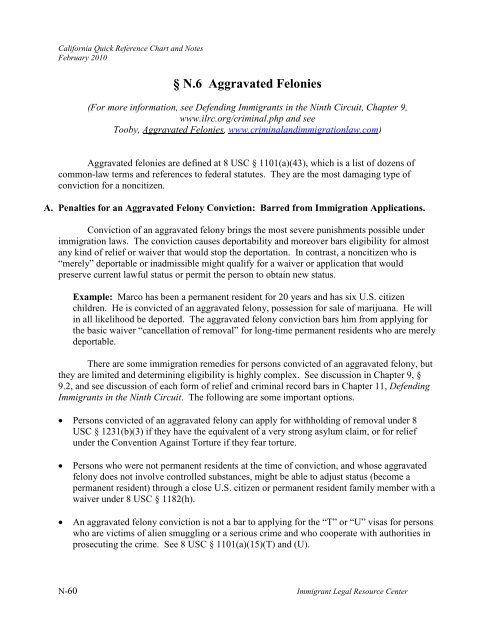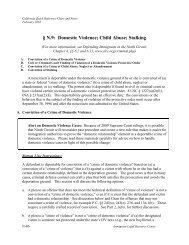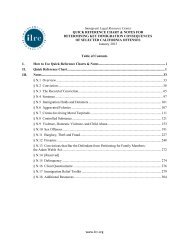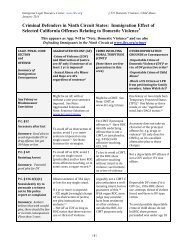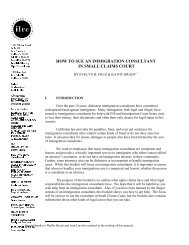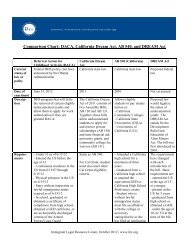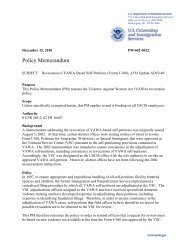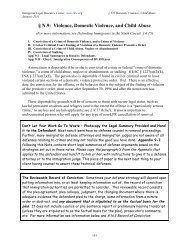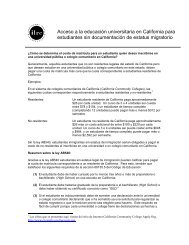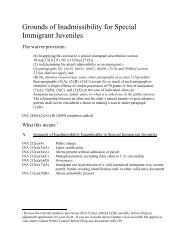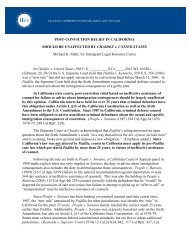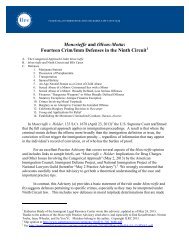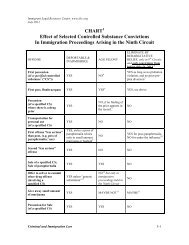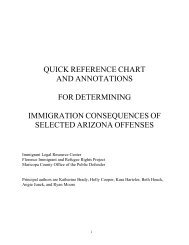quick reference chart and notes for determining immigration - ILRC
quick reference chart and notes for determining immigration - ILRC
quick reference chart and notes for determining immigration - ILRC
You also want an ePaper? Increase the reach of your titles
YUMPU automatically turns print PDFs into web optimized ePapers that Google loves.
Cali<strong>for</strong>nia Quick Reference Chart <strong>and</strong> Notes<br />
February 2010<br />
§ N.6 Aggravated Felonies<br />
(For more in<strong>for</strong>mation, see Defending Immigrants in the Ninth Circuit, Chapter 9,<br />
www.ilrc.org/criminal.php <strong>and</strong> see<br />
Tooby, Aggravated Felonies, www.criminal<strong>and</strong><strong>immigration</strong>law.com)<br />
Aggravated felonies are defined at 8 USC § 1101(a)(43), which is a list of dozens of<br />
common-law terms <strong>and</strong> <strong>reference</strong>s to federal statutes. They are the most damaging type of<br />
conviction <strong>for</strong> a noncitizen.<br />
A. Penalties <strong>for</strong> an Aggravated Felony Conviction: Barred from Immigration Applications.<br />
Conviction of an aggravated felony brings the most severe punishments possible under<br />
<strong>immigration</strong> laws. The conviction causes deportability <strong>and</strong> moreover bars eligibility <strong>for</strong> almost<br />
any kind of relief or waiver that would stop the deportation. In contrast, a noncitizen who is<br />
“merely” deportable or inadmissible might qualify <strong>for</strong> a waiver or application that would<br />
preserve current lawful status or permit the person to obtain new status.<br />
Example: Marco has been a permanent resident <strong>for</strong> 20 years <strong>and</strong> has six U.S. citizen<br />
children. He is convicted of an aggravated felony, possession <strong>for</strong> sale of marijuana. He will<br />
in all likelihood be deported. The aggravated felony conviction bars him from applying <strong>for</strong><br />
the basic waiver “cancellation of removal” <strong>for</strong> long-time permanent residents who are merely<br />
deportable.<br />
There are some <strong>immigration</strong> remedies <strong>for</strong> persons convicted of an aggravated felony, but<br />
they are limited <strong>and</strong> <strong>determining</strong> eligibility is highly complex. See discussion in Chapter 9, §<br />
9.2, <strong>and</strong> see discussion of each <strong>for</strong>m of relief <strong>and</strong> criminal record bars in Chapter 11, Defending<br />
Immigrants in the Ninth Circuit. The following are some important options.<br />
• Persons convicted of an aggravated felony can apply <strong>for</strong> withholding of removal under 8<br />
USC § 1231(b)(3) if they have the equivalent of a very strong asylum claim, or <strong>for</strong> relief<br />
under the Convention Against Torture if they fear torture.<br />
• Persons who were not permanent residents at the time of conviction, <strong>and</strong> whose aggravated<br />
felony does not involve controlled substances, might be able to adjust status (become a<br />
permanent resident) through a close U.S. citizen or permanent resident family member with a<br />
waiver under 8 USC § 1182(h).<br />
• An aggravated felony conviction is not a bar to applying <strong>for</strong> the “T” or “U” visas <strong>for</strong> persons<br />
who are victims of alien smuggling or a serious crime <strong>and</strong> who cooperate with authorities in<br />
prosecuting the crime. See 8 USC § 1101(a)(15)(T) <strong>and</strong> (U).<br />
N-60 Immigrant Legal Resource Center


